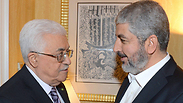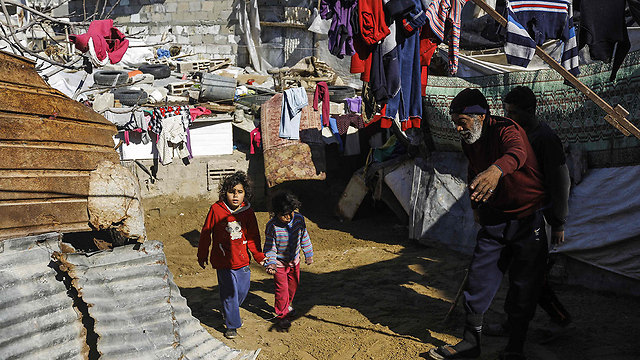


The ‘impending humanitarian disaster’ syndrome
Op-ed: The warnings of an imminent crisis in Gaza have been adopted by the Palestinians as a sophisticated and profitable economic measure. The West donates money, the disaster is always averted and the Palestinians have become addicted to donations. Will President Trump finally put an end to this situation?
The “cry wolf” warning of a “probable disaster” was already voiced in April 2006, several times in 2007, at the beginning and end of 2011, when “a state of emergency” was also declared in Gaza, and a few times in 2014 and 2016. As part of this ritual, it was also mentioned that there was a water shortage in Gaza, that homes had barely four hours of power a day, that premature babies, infants and elderly people could suffer from the situation, and a few other marketing facts advancing an “imminent disaster.” The Palestinians, both in the West Bank and Gaza, favor “the process” over peace. They suffer from the “impending humanitarian disaster” syndrome.

In the past 50 years, there has been no humanitarian crisis in the “territories,” and my guess is that there won’t be one either, because there will always be donor states that will do everything in their power to prevent such a “disaster.” Everyone is gaining from this situation. The Palestinians are receiving huge amounts of money as a gift, and the “donors” feel as if they allegedly “saved the Palestinians from starvation.”
But when the United States, Germany, Japan, the Netherlands and Scandinavian countries transfer their taxpayer money to the West Bank and to Gaza—and that’s how things have been working for decades—they are singlehandedly preventing both the Palestinian Authority in the West Bank and the Hamas government in the strip from emerging once and for all from the vicious circle of becoming enslaved and even addicted to donations. Most importantly, their failure to disconnect from the donor’s continuous feeding helps the Palestinians' leaders become rich.
Until the Oslo Agreements in 1994 and 1995, the Palestinians were diligent people, who supported themselves with great difficulties but with dignity. The billions of dollars/euros infused by “donors”—allegedly for the “reconstruction of the territories” so that the Palestinian government would be able to establish employment infrastructure in “the territories” so that Palestinians won’t have to go to Israel to work—have been scattered in every direction, except for the goals they were allotted for in first place.
The funds were used to establish terrorist militias, to pay bribes to third-world countries in exchange for political support for the PLO and to hand out gifts to cronies, including Suha Arafat. Experts have calculated that the donated money could have been used to build a proper home for every Palestinian resident, and there would have even been money left to buy a car.
The Palestinians' leaders fell in love with this process. Why wouldn’t they? They are not required to produce a thing apart from turmoil, nor are they are not asked to pay for this service in diplomatic moves like other countries. All they have to do is wrap themselves up in the miserable person’s robe, cry out that “it’s all the occupation’s fault”—an occupation which ended, by the way, decades ago—and the money will start flowing in.
Just a reminder: Hamas leaders Khaled Mashaal and Moussa Abu Marzouk are billionaires; Yasser Arafat hid billions in different banks abroad; Mahmoud Abbas and his sons made their fortune in mysterious ways as well. While the residents of the West Bank and Gaza are groaning beneath the daily difficulties, the Palestinian political and security leaders in the two areas are enjoying the funds that are donated mainly into their pockets.
Several years ago, an Israeli NGO asked to transfer thousands of computers to the West Bank children. They turned to the Palestinian Authority heads in Ramallah, and one of the senior officials there agreed—under the condition that all the computers would be delivered to his office so that he would be able to hand them out as he saw fit.
“Do you take computers for yourselves as well?” he was asked. “Well, of course,” he replied. “Don’t our children (the PA workers’ children) deserve computers?” There is no wonder that the general public refers to its leaders as footpads because of this obscene habit.
President Trump, with the Palestinians act like a businessman. Demand transparency, increased efficiency and accountability. Donation? Not on your watch.
Dr. Colonel (res.) Moshe Elad is a lecturer at the Western Galilee College and has served in the past in senior positions in the territories.















